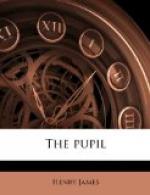On the Friday he saw them all, as Mrs. Moreen had promised, for her husband had come back and the girls and the other son were at home. Mr. Moreen had a white moustache, a confiding manner and, in his buttonhole, the ribbon of a foreign order—bestowed, as Pemberton eventually learned, for services. For what services he never clearly ascertained: this was a point—one of a large number—that Mr. Moreen’s manner never confided. What it emphatically did confide was that he was even more a man of the world than you might first make out. Ulick, the firstborn, was in visible training for the same profession—under the disadvantage as yet, however, of a buttonhole but feebly floral and a moustache with no pretensions to type. The girls had hair and figures and manners and small fat feet, but had never been out alone. As for Mrs. Moreen Pemberton saw on a nearer view that her elegance was intermittent and her parts didn’t always match. Her husband, as she had promised, met with enthusiasm Pemberton’s ideas in regard to a salary. The young man had endeavoured to keep these stammerings modest, and Mr. Moreen made it no secret that he found them wanting in “style.” He further mentioned that he aspired to be intimate with his children, to be their best friend, and that he was always looking out for them. That was what he went off for, to London and other places—to look out; and this vigilance was the theory of life, as well as the real occupation, of the whole family. They all looked out, for they were very frank on the subject of its being necessary. They desired it to be understood that they were earnest people, and also that their fortune, though quite adequate for earnest people, required the most careful administration. Mr. Moreen, as the parent bird, sought sustenance for the nest. Ulick invoked support mainly at the club, where Pemberton guessed that it was usually served on green cloth. The girls used to do up their hair and their frocks themselves, and our young man felt appealed to to be glad, in regard to Morgan’s education, that, though it must naturally be of the best, it didn’t cost too much. After a little he was glad, forgetting at times his own needs in the interest inspired by the child’s character and culture and the pleasure of making easy terms for him.
During the first weeks of their acquaintance Morgan had been as puzzling as a page in an unknown language—altogether different from the obvious little Anglo-Saxons who had misrepresented childhood to Pemberton. Indeed the whole mystic volume in which the boy had been amateurishly bound demanded some practice in translation. To-day, after a considerable interval, there is something phantasmagoria, like a prismatic reflexion or a serial novel, in Pemberton’s memory of the queerness of the Moreens. If it were not for a few tangible tokens—a lock of Morgan’s hair cut by his own hand, and the half-dozen letters received from him when they were disjoined—the whole




